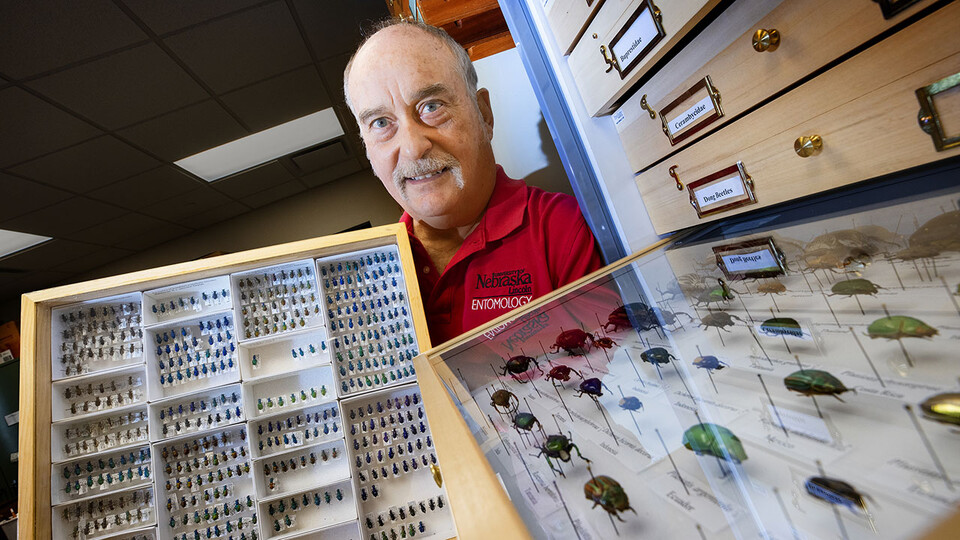Steve Spomer, who has built a 40-year legacy with the University of Nebraska–Lincoln’s Department of Entomology, will retire in December.
A research technician, Spomer has been interested in butterflies and moths in Nebraska since his youth. Over the years, he has participated in a range of research related to ecology and management of insects in various crops. He has identified about 700 species of insects and coined the name for perhaps Nebraska’s most famous insect — the endangered Salt Creek Tiger Beetle.
“I wouldn’t have stayed here if I wouldn’t have loved it,” Spomer said. “There have been some tough times, but they’ve all been very interesting jobs and all different.”
In his first job in the entomology department, Spomer traveled across the state to sorghum fields collecting green bugs — an excuse to search for and study butterflies and other insects. An avid outdoorsman, Spomer was happy when his work had him collecting insects across the state. Some of his most satisfying field work took place over the three decades he spent researching the Salt Creek Tiger Beetle, found only in the Salt Creek watershed.
Spomer recalls searching for and counting the beetles at night. At first, he didn’t realize how rare they were. Eventually, he would coin the name.
Born and raised in Lincoln, Spomer received his bachelor’s degree in entomology and zoology and master’s degree in entomology from Nebraska.
His love for butterflies was kicked-started by a friend, and it wasn’t long before he was caught up in the mysterious, fluttering creatures.
“It all started with butterflies back in grade school,” Spomer said. “One of my friends invited me over to collect butterflies from their big lilac bushes.”
Spomer’s mother was an artist with a delicate hand. She purchased equipment and helped Spomer carefully spread the wings of butterflies without tearing them. Those butterflies are still perfectly preserved.
Spomer has spent almost half of his career working with students in Entomology 818, Insect Identification and Natural History. His experience and precision with correctly identifying insects is superb, and he can identify thousands mostly by sight. After honing his identification skills for 20 years, it has become a little easier, though he said it can still be a challenge.
His expertise in identification served him well as he judged the 4-H insect collections at the Nebraska State Fair for almost 20 years.
“I was considered one of the tougher graders,” Spomer said with a smile. “If you took 4-H and got a red ribbon instead of a blue ribbon, it was probably my fault.”
For 10 years, Spomer has taken graduate students on overnight collection trips to Indian Cave State Park as part of ENTO 800, Insect Biodiversity. More recently, Spomer became lab coordinator for Entomology 116, Insect Identification.
Spomer said the transition from a pure research position to a teaching position was stressful because he wasn’t used to working with students and worrying about groups and upcoming exams. He said he sometimes woke up in the middle of the night worrying whether his students were ready for an exam. He is proud to have worked in a department that puts students first, he said.
“Entomology was one of the first departments to get into online courses, one of the forerunners here at UNL, even before COVID-19, and I think that’s why our department has survived and remained our own department,” Spomer said.
When not teaching students, working on publishing a book about Nebraska butterflies , rearing insects or traveling the state collecting, Spomer can be found culling his butterfly collection.
Over the years, he has donated thousands of butterflies to the University of Nebraska State Museum. His collection, which started with those carefully pinned butterflies his mother helped him set all those years ago, has ballooned since.
“I don’t want to get to the point where I have to buy another house to hold my collection,” he said.
Looking back on his career, Spomer relishes being able to study his interests and have fun doing it.
“Do what you want to do, but make sure you can get a job doing that,” Spomer said. “Don’t do something just to get a job. If you don’t like it, don’t do it — it’s just not worth it.”






